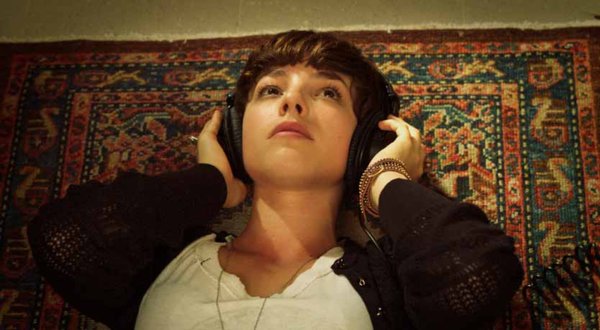Nobody Walks
directed by Ry Russo-Young
Magnolia Pictures, 2012
Nobody Walks opens beneath a flight pattern, glaring under warm California sun. In the airport parking garage, twenty-three year old Brooklyn émigré Martine (Olivia Thirlby) disinterestedly kisses a man. We presume they’re lovers, but get a small twist, all before opening credits roll over the ride from LAX to Silverlake. It’s an apt start to a film that views Los Angeles as a wood-paneled utopia in perpetual soft focus.
Martine arrives at the home of Peter (John Krasinski) and his rigidly postured wife Julie (Rosemary Dewitt). She’s a therapist being courted by her sleazy screenwriter patient (Justin Kirk). He’s a sound editor offering to put up friend-of-a-friend Martine, and work pro-bono on her black and white gallery film of insects crawling over a woman’s breast. Their flirtation begins immediately. “What if you could hear the bug’s steps, or breath, or heartbeat?” he asks her as they watch a silent rough cut. Her reply – “Yeah, or its heart ache, you know?” is our second hint in as many scenes that she may be a bit of a flake.
Rounding out the household is Kolt (India Ennenga), Julie’s daughter from a previous marriage to dim-witted Vedder acolyte Leroy (Dylan McDermott). I was rooting for Kolt after her introduction, successfully pitching a poem to her high school lit mag. But like Julie’s prospective infidelity, Kolt’s scenes are listless. She primarily chides her flirtatious Italian tutor, and swoons over Peter’s assistant David (Rhys Wakefield), a gentle tech nerd with a twelve-pack and Abercrombie model cheekbones.
Much has been made of co-writer and newly crowned memoirist supreme Lena Dunham’s attachment to the film. But the script penned by her and director Russo-Young is short and airy, lacking the grit of Girls, and content with odd, faux-profound throwaway moments – as when Kolt’s tutor tells her that “poets don’t need practical words” when she asks him to translate “suitcase”. Apparently he hasn’t read “Le Voyage” or “Song of the Open Road”. Aside from one interesting bedtime conversation with Julie about the often arbitrary nature of settling into commitments, Kolt’s presence is weightless within an already trifling tale: whipped cream atop meringue. And her name! Oy vey.
Still, Dewitt and Krasinski have some real chemistry, capturing the lived-in neuroses of a long relationship while fitting in some solid smooching. These are parents who flip each other the bird, and trust their kids to fend for themselves at dinnertime. But the film’s lack of true tension means we never buy that their marriage is in danger. The hope is that something will happen beyond various combinations of these people giving each other salacious glances. Yet all of this cheating and teenage lust fails to even flicker with heat, as if the sex is being recalled by someone who barely remembers it.
The film’s best scene is a rich montage of Martine and David compiling sound effects for her film: the strike of a matchstick, a can opener tearing through a lid, a squozen lemon. Yet even this segues to an clumsy moment in which he asks her to lie down, eyes closed, to see if she can recognize the sound of her own breath echoing through his phallic directional microphone, hovering just above her lips.
Krasinski gives the most lived-in performance of the bunch. He sells his awe of Martine ably: in her company, his face subtly spans a range of reds and blues. He’s a smiler, eager to be liked by everyone, whose brooding lies just beneath the surface. Dewitt too has moments suited to the film’s light touch, in which she reveals a history of heartbreak out of a pause or sigh. But the film is Thirlby’s, and while often hindered by the script, she finally fails to evoke the mystery and seductive power which we’re to believe that her character wields. In Pasolini’s slow burning Teorema, a very different movie about a strange houseguest’s effect on his hosts, we’re convinced that the right smoldering glance from Terence Stamp can demolish an entire family. Nobody Walks miscasts Thirlby, who has shown wit and charm in Snow Angels and the cinema non grata of Juno. She’s beautiful, and a capable actor, but the film’s chief miscue is that is she’s no Shiva, destroyer of worlds.
Follow Vol. 1 Brooklyn on Twitter, Facebook, Google + and our Tumblr.

